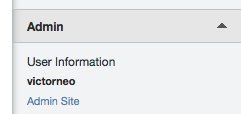
Help Scout integration for Django.
If you are using Help Scout to handle support tickets from your users for your Django web application, you can use Help Scout's custom app feature to provide information on the user, such as the following:
This project provides a Django app which allows you to integrate Custom App into your Django web application and easily customize the output HTML.
You can install this library via pip:
pip install django-helpscout
Once installed, add django_helpscout to your INSTALLED_APPS:
INSTALLED_APPS = (
...,
'django_helpscout'
...,
)
A Django view is provided to make it easy for you to get started. First, add
the view to your urls.py:
from django_helpscout.views import helpscout_user
urlpatterns = patterns('',
# Your URL definitions
url(r'^helpscout-user/$', helpscout_user),
)
Once done, deploy your web application to production and point your Help Scout custom app URL to the url you have configured above and you should see a simple HTML output on Help Scout with the user's username and date joined.
You will most likely want to customize the HTML output to add in additional information related to the user. This library provides an easy way for you to override the templates that are used.
In your templates folder, create the following structure:
templates/
|- django_helpscout
|- 404.html
|- helpscout.html
Details on the two templates:
404.html- Used when a user with the given email address is not found
helpscout.html- Used when a user is found
By adding your own templates and effectively overriding the library's built-in templates, you can customize the output to suit your needs.
You might want to use select_related to prefetch related models
for a particular user, or you have complicated processing involved
when loading a user. A helper decorator is available if you wish to
use your own views.
The decorator helps you deal with verifying Help Scout's signature when a request is made from their side. You can use the decorator in the following manner:
from django_helpscout.helpers import helpscout_request
# your view
@helpscout_request
def load_user_for_helpscout(request):
... code here ...
Copyright 2014 Victor Neo
Licensed under the Apache License, Version 2.0 (the "License"); you may not use this file except in compliance with the License. You may obtain a copy of the License at
http://www.apache.org/licenses/LICENSE-2.0
Unless required by applicable law or agreed to in writing, software distributed under the License is distributed on an "AS IS" BASIS, WITHOUT WARRANTIES OR CONDITIONS OF ANY KIND, either express or implied. See the License for the specific language governing permissions and limitations under the License.
